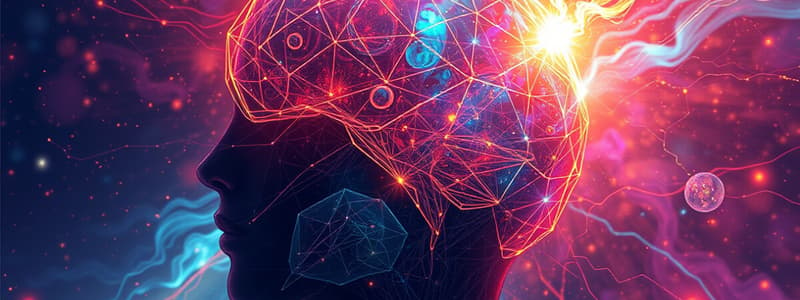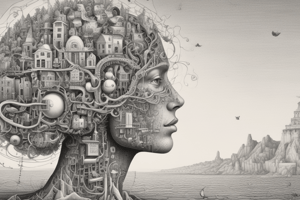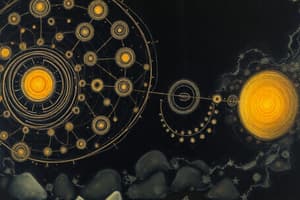Podcast
Questions and Answers
In daylight, the shortest wavelengths of light in the visible spectrum will look red.
In daylight, the shortest wavelengths of light in the visible spectrum will look red.
False (B)
Nerve hearing impairment due to problems in the auditory cortex of the brain has been easily corrected with hearing aids.
Nerve hearing impairment due to problems in the auditory cortex of the brain has been easily corrected with hearing aids.
False (B)
Olfactory receptor cells are located in the back of the throat.
Olfactory receptor cells are located in the back of the throat.
False (B)
The amount of light let into the eye is controlled by the iris.
The amount of light let into the eye is controlled by the iris.
The pathway from the retina to the brain that enables us to see is rods and cones to bipolar cells to ganglion cells to optic nerve.
The pathway from the retina to the brain that enables us to see is rods and cones to bipolar cells to ganglion cells to optic nerve.
The problem with the trichromatic theory of color vision is that it did not adequately explain color blindness and why staring at the reversed American flag produced an afterimage of a flag with the correct colors.
The problem with the trichromatic theory of color vision is that it did not adequately explain color blindness and why staring at the reversed American flag produced an afterimage of a flag with the correct colors.
A person with red-green color blindness will see the world in ________.
A person with red-green color blindness will see the world in ________.
According to the opponent-process theory of color vision, the correct pairings of opposite colors are ________.
According to the opponent-process theory of color vision, the correct pairings of opposite colors are ________.
Analyzing smaller features and building up to a complete perception is called ________.
Analyzing smaller features and building up to a complete perception is called ________.
Bottom-up processing is initiated by ________.
Bottom-up processing is initiated by ________.
If you stare for 30 seconds at a red object and then look at a blank sheet of white paper, you will see a greenish image of the object. This phenomenon BEST supports the ________ theory of color vision.
If you stare for 30 seconds at a red object and then look at a blank sheet of white paper, you will see a greenish image of the object. This phenomenon BEST supports the ________ theory of color vision.
Perception is the ________.
Perception is the ________.
The average threshold for human hearing is the tick of a watch from ________ under very quiet conditions.
The average threshold for human hearing is the tick of a watch from ________ under very quiet conditions.
The bone that is attached to the eardrum is called the ________; the bone that is connected to the oval window is called the ________.
The bone that is attached to the eardrum is called the ________; the bone that is connected to the oval window is called the ________.
The change in the shape of the lens in order to focus on a visual image is known as ________.
The change in the shape of the lens in order to focus on a visual image is known as ________.
The clear, transparent protective coating over the front part of the eye is the ________.
The clear, transparent protective coating over the front part of the eye is the ________.
The eardrum is also called the ________.
The eardrum is also called the ________.
The fact that, when we look at an object, each one of our two eyes receives a slightly different image of the object is known as ________.
The fact that, when we look at an object, each one of our two eyes receives a slightly different image of the object is known as ________.
The idea that pain signals must pass through a type of 'doorway' in the spinal cord is referred to as the ________.
The idea that pain signals must pass through a type of 'doorway' in the spinal cord is referred to as the ________.
The tendency to perceive objects that are close to each other as part of the same grouping is known as ________.
The tendency to perceive objects that are close to each other as part of the same grouping is known as ________.
Flashcards are hidden until you start studying
Study Notes
Vision and Color Perception
- Shortest wavelengths of visible light in daylight appear red (False).
- Iris controls the light entering the eye (True).
- Pathway from retina to brain: rods and cones → bipolar cells → ganglion cells → optic nerve (True).
- Trichromatic theory of color vision does not explain color blindness or afterimages (True).
- Red-green color blindness results in seeing blues, yellows, and grays.
Opponent-Process Theory
- Opponent-process theory identifies correct opposing color pairs: red vs. green, blue vs. yellow.
- Staring at red and then white leads to seeing green, supporting opponent-process theory.
Sensation and Perception
- Perception is interpreting sensations meaningfully.
- Bottom-up processing involves analyzing smaller features to create a complete perception, initiated by stimulus.
Auditory Perception
- Average threshold for human hearing: a ticking watch heard from 20 feet under quiet conditions.
- The hammer (malleus) connects to the eardrum; the stirrup (stapes) connects to the oval window.
Other Key Concepts
- Visual accommodation refers to the lens changing shape to focus on images.
- The cornea is the clear protective coating at the front of the eye.
- The eardrum is also known as the tympanic membrane.
- Binocular disparity refers to the slightly different images each eye perceives.
- Gate-control theory of pain suggests pain signals pass through a "doorway" in the spinal cord.
- Proximity is the tendency to group nearby objects together.
Studying That Suits You
Use AI to generate personalized quizzes and flashcards to suit your learning preferences.




